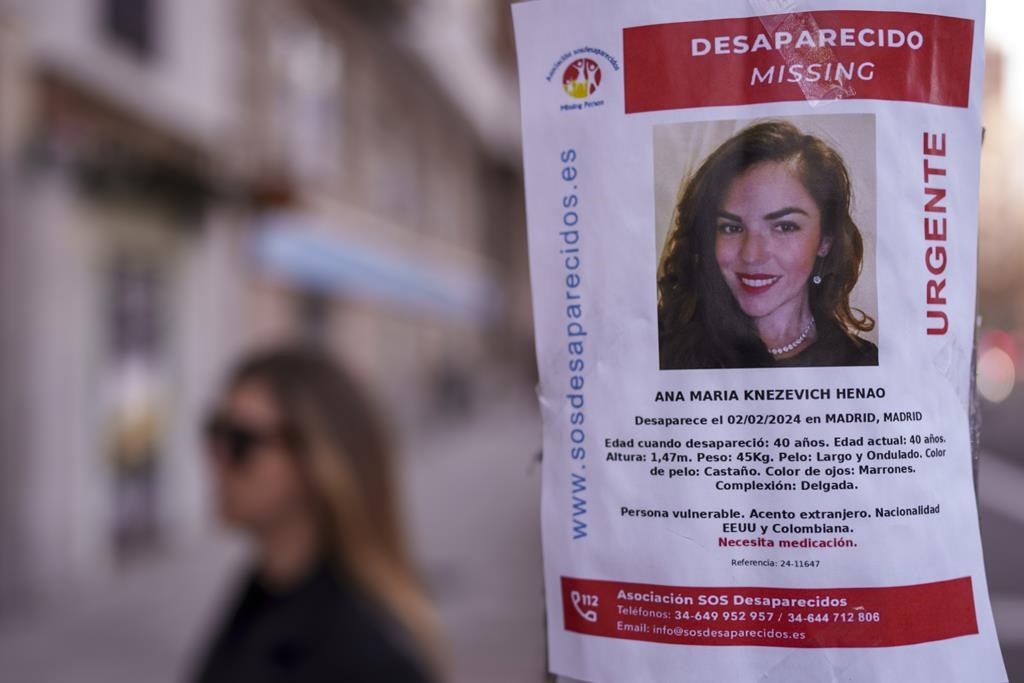FBI lays out detailed case against Florida man accused in wife’s disappearance in Spain

Posted May 7, 2024 06:42:50 AM.
Last Updated May 7, 2024 11:25:15 AM.
FORT LAUDERDALE, Fla. (AP) — The FBI has laid out a detailed case showing why agents believe a Florida man is behind his estranged wife’s disappearance from her apartment in Spain but gave no indication about what they think happened to her.
Court documents released late Monday show that agents believe David Knezevich resembles the man wearing a motorcycle helmet who spray painted the security camera lens outside Ana Knezevich’s Madrid apartment on Feb. 2. The man left an hour later carrying a suitcase.
Spanish police say they have security video of the 36-year-old Fort Lauderdale business owner purchasing the same brand of paint and duct tape hours earlier. Investigators also interviewed a woman who says Knezevich asked her to translate a text message that was sent to his wife’s friends after her disappearance.
Knezevich’s attorney, Ken Padowitz, did not return a call or email on Tuesday seeking comment. He has said his client is innocent and was in his native Serbia on the day his 40-year-old wife disappeared, 1,600 miles (2,500 kilometers) away. But agents say Knezevich rented a Peugeot in the Serbian capital Belgrade four days earlier.
A few days later, a Spanish driver reported his license plates were stolen. On the night Ana Knezevich disappeared, a license plate reader on her Madrid street recorded the stolen plate number, Spanish police found.
Additionally, hours after she disappeared, a Peugeot bearing the stolen license plates went through a suburban Madrid toll booth, surveillance video showed. The driver could not be seen behind the tinted windows.
The rental agency told investigators that when Knezevich returned the car five weeks later, the license plates had been replaced and the windows had been tinted. It had been driven almost 4,800 miles (7,700 kilometers).
The FBI arrested Knezevich, a naturalized American, at Miami International Airport on Saturday. He is charged with kidnapping and is being held pending a bail hearing. The Knezeviches, who sometimes spell their surname “Knezevic,” have been married for 13 years. They own EOX Technology Solutions Inc., which does computer support for South Florida businesses. Records show they also own a home and two other Fort Lauderdale properties, one of those currently under foreclosure.
Ana’s brother, Juan Henao, called the couple’s divorce “nasty” in an interview with a Fort Lauderdale detective, a report shows. He told police David was angry that they would be dividing a substantial amount of money. Ana is a naturalized American from Colombia.
The most detailed section of the FBI’s 11-page complaint against Knezevich involves an unnamed Colombian woman he met on a dating app last fall, about the time his wife moved to Europe.
On the morning after his wife disappeared, the FBI says Knezevich texted the woman seeking a favor — would she translate into “perfect Colombian” Spanish a few English sentences for a friend who was writing a screenplay?
The woman replied she doesn’t speak English and would have to use a generic online Spanish translator. Knezevich replied that’s fine, she could then tweak it to make it sound Colombian.
According to the FBI, he then sent the woman this passage in English: “I met someone wonderful. He has a summer house about 2h (two hours) from Madrid. We are going there now and I will spend a few days there. There is barely any signal though. I will call you when I come back. Kisses.”
The woman made her translation and sent it back.
That morning, that translated message was texted to two of Ana’s friends from her phone.
They said it didn’t sound like her. They contacted Spanish police, launching the investigation.
One of those friends, Sanna Rameau, told The Associated Press on Tuesday that after reading the FBI’s report, she no longer believes Ana will be found alive.
“I’m in shock,” she said. “When it’s presented in black-and-white, it’s different than when you only have suspicions and speculations.”
Terry Spencer, The Associated Press








